The Discovery Series SHOUD 4
Presented to the Crimson Circle Dec 7, 2013
Original Website http://www.crimsoncircle.com/
I Am that I Am, Adamus of Sovereign Domain.
Welcome dear Shaumbra. Welcome to this holiday, this festive holiday season. (someone hands him a necklace made of Christmas lights) Oh, my dear. (audience responds βAhhh!β as he puts it on) Ahhh. Yes, a little color, a little style. Yes.
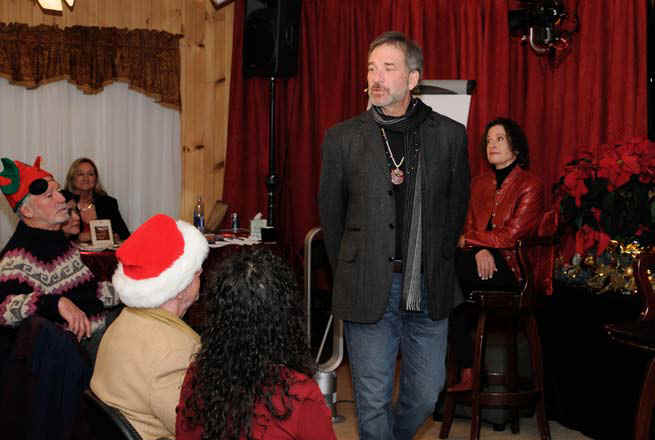 Welcome, dear Shaumbra, to this gathering. The room is
filled, much more than it has been the last few months; not just with humans,
but entities. You know I don't often take guests at our gatherings. Ah. I'm
asked once in a while β was asked today as a matter of fact, it almost broke my
heart when I was asked β βWhere is Kuthumi?β Ohhhh. Kuthumi will be here
when it's time.
Welcome, dear Shaumbra, to this gathering. The room is
filled, much more than it has been the last few months; not just with humans,
but entities. You know I don't often take guests at our gatherings. Ah. I'm
asked once in a while β was asked today as a matter of fact, it almost broke my
heart when I was asked β βWhere is Kuthumi?β Ohhhh. Kuthumi will be here
when it's time.
But in the mean time you've got me every step of the manure-filled way. Every step. (a few βYaysβ and some claps)
So, dear Shaumbra, yes, indeed, the room is filled. We have some special guests with us today because of the holiday season, but also an interesting phenomena, worthy of an Adamus Award, the first, I hope, of many today, because Cauldre has no more money left (some chuckles), so we hand cheesy awards, but valuable. Many guests.
γγ
Today's Guest
And it was interesting when the Master, David, or David the McMaster, was doing his opening, his helping to set the energy, and he spoke a name that was heard in the other realms β Nelson Mandela. That β the emotion, the feeling and the passion that was coming from David, the reaction from all of you β has actually attracted Nelson Mandela right here. (some applause) I don't know how long he's going to stay. Very busy these days. But, indeed, absolutely, an Adamus Award for David.
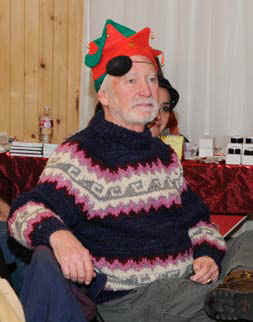 LINDA: Oh, for David.
LINDA: Oh, for David.
ADAMUS: For David.
LINDA: Not for Mandela.
ADAMUS: For David. (some claps)
LINDA: For David.
ADAMUS: For David.
Indeed, you can imagine with all of the outpouring of feelings all around the world, but from right here from the heart of Shaumbraville, the feeling goes out and he stops in. βWhat's happening with humans?β he says. βI'm going to stop in.β So I opened the door myself personally. He'll be here for a little while.
γγ
Nelson Mandela
Interesting. What about Nelson Mandela? Is he Shaumbra? Never knew what Shaumbra was until right now. Come back here! Back in the room! (laughter as Adamus motions to βgrabβ Mr. Mandela and bring him back) Never knew. He's got a great sense of humor. A good leader has to have a sense of humor. Please write that down in your Adamus book of sayings. Has to have a good sense of humor.
Oh, the world such a β back over here (presumably to Mr. Mandela) β challenging place right now for all of us, for all of you. You've got to have a sense of humor. You've got to be able to laugh at yourself and yes at others. Yes. (laughter) Or with them, I should say.
So, what is it about Nelson Mandela that brought him to where he's at? You could almost imagine. Feel into it for a moment before I give my answer.
What caused him to have such passion, such drive, such clarity and humanity? It was adversity. Adversity, don't you know. It was adversity that drove so deep into his heart and deep into his soul, making such commitments to himself β βI will never again be a Dutch slaver. Never again be a slaver.β
Indeed, he was, in a time past, in a lifetime past, cruel, brutal, (some equipment is buzzing), no re- β¦ no regard β¦ make a note of that in the transcript. Something is buzzing, vibrating, and I'm not sure what it is.
LINDA: Are your pockets empty? (she giggles and it buzzes again)
ADAMUS: Somebody's vibrator is on. Please turn it off. It's not so appropriate. (laughter) You'll have plenty of time for that later, but not right now. (Adamus chuckles) Larry, was that yours? Larry, sense of humor. Ha, ha, ha, ha, ha! Ho, ho, ho, ho, ho! Aargh.
So, Nelson Mandela, yes, a brutal slaver, and as so many of you know from lifetimes past, from adversity in your own life, from suddenly waking up one day and saying, βWhat did I do? What was I thinking?β To be able to go from that, my dear friends, that awful feeling of knowing you had done something that would hurt another or yourself, that despicable feeling about yourself, that worthless feeling like you're just being ground to a pulp.
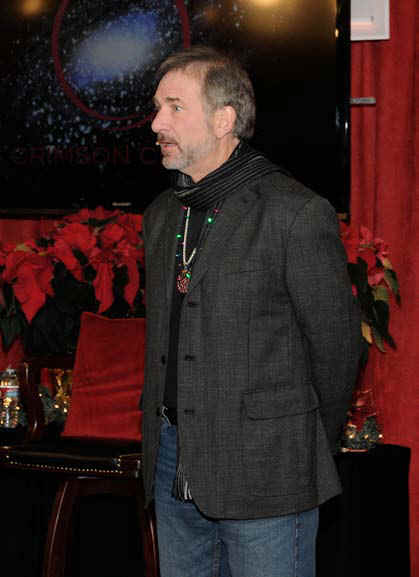 Where
at one point you had felt like a mighty grand being, royalty, boss, the big
guy, the big lady, power and everything else, and suddenly β suddenly, coming
face to face with your own soul who doesn't see you quite that way. Your soul
who says, βWhat was that lifetime
about?β Suddenly, falling into the abyss, seeing the ghosts of yourself and of
your past, and then what? Then what? To raise you up from those depths and that
darkness, then what?
Where
at one point you had felt like a mighty grand being, royalty, boss, the big
guy, the big lady, power and everything else, and suddenly β suddenly, coming
face to face with your own soul who doesn't see you quite that way. Your soul
who says, βWhat was that lifetime
about?β Suddenly, falling into the abyss, seeing the ghosts of yourself and of
your past, and then what? Then what? To raise you up from those depths and that
darkness, then what?
Forgiveness of yourself. Forgiveness of yourself. Taking a deep breath and releasing all of that guilt, all of that shame. Not an easy thing to do. Saying, not just saying in your head, but saying, βI release myself. These were experiences in a lower consciousness in a less awareness time. These were part of my experiences and everyone else's.β
It's not justification. It's absolute forgiveness. It's not trying to make amends in your mind. It's not trying to sugarcoat a situation. It's saying, βI, dear Godself, forgive myself and all others,β and indeed did not Nelson Mandela, even with all of his rage and anger for his incarceration and the torture that he endured, did he not then forgive those very ones who imprisoned him, who held him back, because he realized that in so many ways they were serving him.
They were serving his guilt for what he had done. They were serving his coming to a greater awareness of the I Am within himself and everyone else. And in that forgiveness of others, he was truly released.
He had such depth and such understanding and clarity at that point, he could then be a leader. Not a leader who tried to acquire power, make new rules, inflict himself on others, but a leader to say one thing to all people β βYou are free also. You are free.β
He didn't seek the limelight. He wasn't interested in money. He had his human, what you would call, flaws, idiosyncrasies, of course. As long as you live on this planet, you're going to have those idiosyncrasies. But more than anything he understood the freedom of himself and passed that along to others.
What's he going to do from here? Cross over? Go into his Third Circle? Probably not. Probably not. Too much work to do at this all-important time on this planet. Too many people that need to hear the words that βYou are free!β Too many people that need to get out of their own victimness.
It's not necessarily the abuser that he's going to try to work with, because the abuser, in a way, is just responding to the victim. He learned that. It's the ones who are victims, the ones who say, βI can't do this because β because of my color, because of my upbringing, because of my handicap or disability, because β¦β That's just victim energy. Once you realize that, once you release that, you are indeed free. There's nothing, dear Edith, my love (he kisses her on the cheek), nothing that can hold you back other than being in that sandbox of victimness, victimhood.
So dear Nelson Mandela is not going to go after the world leaders. Not going to go after the abusers, the dictators, those who abuse power and energy. He's going to go straight for the ones who are playing the role of victim, because once they say, βNo more,β there can be no more abusers. There can be no more enslavers. Once humans say, βNo more,β that sets them free and takes away the illusion of power that any of these type of imbalanced leaders might have.
Let's take a deep breath with that Shaumbra.
Here we are with Nelson Mandela. Thanks to David and all of you for calling in this dear soul on this day. Here we are in the classroom of the new spiritual energy.
γγ
Religion, Spirituality & Shaumbra
What's the difference between religion and spirituality? (a few chuckles) Interesting question. Interesting question. Yeah.
Religion. Religion is generally for β¦ by the way, I'm going to offend some people β where's my camera β I'm going to offend some people today, and I already know that, because I offend them every day. (laughter) I'm going to say some things today intentionally designed to β stay on that camera β aggravate you. Aggravate you. To get you out of your complacency. To get you deep inside yourself.
 Ah, don't turn off the Internet. Stay with us through the
end. There's always a surprise in this box of Crackerjacks. (some laughter)
Ah, don't turn off the Internet. Stay with us through the
end. There's always a surprise in this box of Crackerjacks. (some laughter)
What's the difference between religion and spirituality? Religion, ehh, filled with a lot of victims. Filled with people who don't want to think for themselves. Filled with people who are playing a power game β both sides of it β the members and the leaders.
What's the difference between then spirituality and Shaumbra?
SART: Night and day!
ADAMUS: Night and day. Good, good.
SART: Yeah!
ADAMUS: So you piss them off, not me. (laughter) What's the main difference between what you're doing, why you're here on this planet right now, versus the spiritual crowd?
SHAUMBRA 1 (woman) Accountability.
ADAMUS: Speak up.
SHAUMBRA 1: Accountability.
ADAMUS: Accountability. Good. Good. That's a good one.
SHAUMBRA 2 (woman): Just be. Just be.
ADAMUS: Just be. That's good.
SHAUMBRA 3 (woman): Being a Standard.
ADAMUS: Being a Standard. (a couple of people give a few more answers) Good. Good answers. Great.
MARTY (Mofo): Pissing people off.
ADAMUS: Pissing people off. There you go, Mofo, yes.
Biggest difference I would say is in the spirit-β¦ there was a lot of people involved in spirituality. They leave religion at a certain point because they realize there's a lot of restrictions. They realize that they want to do some thinking on their own. Nothing, absolutely nothing wrong with religion. It serves a purpose up to a point.
Spirituality. People get involved in spirituality. Some wonderful, wonderful things, because it kind of, mmm, sets you free β partially β to begin exploring.
The new age movement, for instance. There's not a central office. There's not a hierarchy. It's pretty loose. Really loose. But in spirituality, it's a lot of searching and seeking. It's a lot of putting your toes in the water to test the temperature, and it can lead to a lot of makyo. Not that it always does, but it can lead to that, because you can forget about the true desires, the knowingness that I talked about last month. You can forget about that and get all caught up in, let's say, an essential oil, and you spend years and years going through all of the essential oils. The only essential oil that's really worth a damn is your own sweat. (some chuckles) You can quote me on that! Ahem.
And it's not that there's anything wrong with essential oils, but there is a tendency to put them in front of you, to say, βThis essential oil is going to bring back some memories. This essential oil is going to trigger this or trigger that.β It's the same with taking natural supplements, herbs. Nothing wrong with that, but you can get over-herbicided. You can get β¦ (a few chuckles at his word) I made that up. You can start to put the power in the herbs.
Now, herbs have a wonderful way of resonating with the body, and the body, having come from a long, long time ago, back to the whales and the dolphins and everything else β¦ speaking of which, isn't it amazing that scientists are beginning to understand the true correlation between dolphins and humans?
LINDA: Oooooh!
ADAMUS: Well, who would have thought you were a fish?
LINDA: Pisces! Hello!
ADAMUS: So, but a lot of these herbal remedies actually wake up, remind something deep within the body of lifetimes tens or hundreds of thousands of years ago when that's all there was. There weren't chemicals. There weren't medicines like you know them now. So you take a certain herbal remedy and it reminds you of things from many, many, many lifetimes ago. It triggers a memory. That's wonderful up to a point. Things were different back then than they are now. The herbal remedy was particularly good for you back then, but it may not do the same thing for you now.
Again, they're wonderful, but easy to get caught up in certain rituals of the spiritual group, of the new age, certain books, classes or anything else; can lead to a lot of makyo. Generally, those on the spiritual path are still searching. They haven't made that commitment. Not in all cases. Please don't send emails to Cauldre β he's telling me to say that β but there's a marked difference between if I was standing here with you versus standing here with a crowd of just spiritual new age types. A tremendous difference.
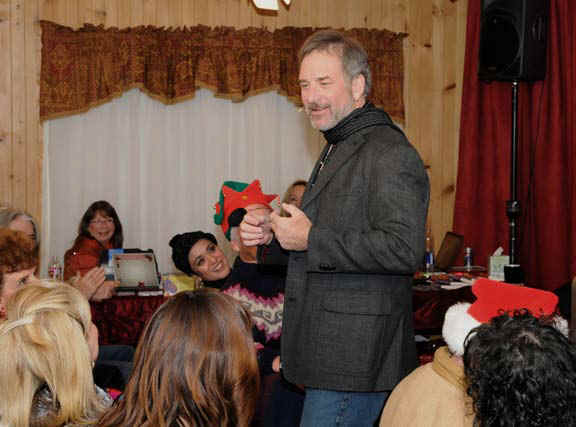 You, my dear friends, have made a commitment, and it's about
enlightenment. It's not about β¦ in spirituality, so much of it is about trying
to make human life a little bit more comfortable. A little bit more comfortable
or sometimes even just justifying some of the harsh things about life. But you've
made a commitment. It goes back to that knowingness that we talked about, something
that you felt deep within you. It wasn't anything that was practiced. It wasn't
anything that you even prepared for. It happened first. Probably because of
some sort of adversity, probably because of even just getting tired of just
going through the birth-death, birth-death cycle. But something inside you
triggered that knowingness.
You, my dear friends, have made a commitment, and it's about
enlightenment. It's not about β¦ in spirituality, so much of it is about trying
to make human life a little bit more comfortable. A little bit more comfortable
or sometimes even just justifying some of the harsh things about life. But you've
made a commitment. It goes back to that knowingness that we talked about, something
that you felt deep within you. It wasn't anything that was practiced. It wasn't
anything that you even prepared for. It happened first. Probably because of
some sort of adversity, probably because of even just getting tired of just
going through the birth-death, birth-death cycle. But something inside you
triggered that knowingness.
As I said in our last gathering, that's the thing then that brought the books, that brought the classes, that brought you eventually right here to these seats. It's enlightenment and the commitment to it. And, as you probably know, it is harder than the spiritual path. Much harder. The spiritual path, I would say, is often designed around making life a little bit more comfortable. The Shaumbra path is basically redefining life entirely, with your body, with your mind, with your spirit, the relationship of you with yourself. Oftentimes, it involves absolutely smashing and shattering any concepts that you had about life, about yourself, about comfort, about happiness. Eventually, you realize those words really have very little or no meaning.
As a matter of fact in enlightenment, so many of those words just go away. It has nothing to do with happiness. You don't actually find Ascended Masters walking around (he brings the podium out) β we're in trouble now Paul β walking around β¦ any time I get out that podium, it's going to be a long one.
PAUL: The easel is dangerous too.
ADAMUS: The easel, very dangerous. Yes. I won't tip this over β until I get some coffee. (laughter) But the β¦
LINDA: Did you want some coffee?
ADAMUS: Ah yes. Cream, no sugar. A little St. Germain β¦ no. (some giggles)
The Shaumbra path literally redefines life. It's not about comfort, as you found out. You tried it. You tried getting β¦ (Linda offers him a napkin) Yeah, please. You tried getting that little bit more comfortable life, and it didn't work. Oh relationships. They were just ground to a pulp. Your thoughts, your everything. Interesting. Ehhh, difficult. Difficult. But you let it happen. I have to honor, commend and acknowledge each and every one of you that's still here, because it's not easy, and you're doing it so very quickly. Sometimes a little scary. It's like driving downhill at a fast speed on this Highway 72 on ice. (Adamus chuckles) Up in the Ascended Masters Club we're like βOhhh geez!β But it's about transcending everything that you thought about yourself and about life. Amazing, simply amazing.
It's said by some that perhaps I'm a little tough (giggles as he shakes his head βnoβ), a little obnoxious (laughter as he nods βyesβ). Yeah. But dear friends, I know how important this is for you, in this lifetime, not next lifetime. Ah, just the thought about it when somebody says, βWell, in your next lifetime after you go through your next birth process β¦β Ohhhh, no, no, no. No. You want it now.
So we're going to push. We're going to push and have fun doing it. Good. (Linda brings the coffee) Thank you, my dear.
LINDA: (whispering) You're welcome.
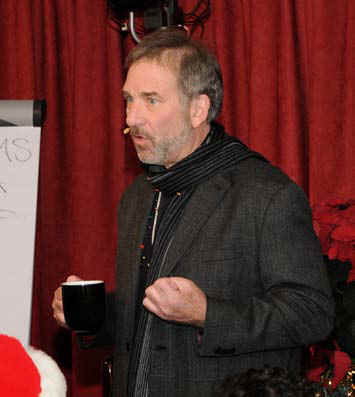 ADAMUS: So let's have some fun. Yes. The point I'm trying to
make is that you are different. (some
chuckles and someone say βWhat do you mean?β) What do you mean? You know
exactly what I mean. (Adamus chuckles)
ADAMUS: So let's have some fun. Yes. The point I'm trying to
make is that you are different. (some
chuckles and someone say βWhat do you mean?β) What do you mean? You know
exactly what I mean. (Adamus chuckles)
You're different. You're different than even your lifetimes when you've been spiritual. Definitely very different than your lifetimes when you've been religious. There's a big difference. We'll actually feel into that in just a little bit.
You're very different, and it takes a lot of grit, a lot of, uh β¦ determination is not the right word. I'll come back to it later. I'll tell you exactly what it takes to be in these seats, to be coming in on the Internet and saying, βIt's about enlightenment.β
The funny thing is, I've said before, when we've been at workshops and I say, βWhat is enlightenment?β I hear the biggest bunch of makyo answers possible. It would lead one to believe that here you are, totally focusing your life on enlightenment, and have no idea what it is. Absolutely no idea what it is. And it's true, and that's a good thing.
You know what it is. You don't have to even define it. You already know. Eh, sometimes it gets covered up. You forget about it. You have one of those bad enlightenment days and you wonder what you're doing. But you go back to that knowingness. Ah, sometimes it's two or three in the morning and you wake up frightened, confused, baffled, but yet that knowingness is there.
It's not a thing of will. It's not a thing of strength. It's a thing of just that knowingness. Beautiful.
γγ
The Jesus Game
Let's play a game today. Let's play the Jesus Game.
LINDA: Ohhh! (some chuckles)
ADAMUS: It's Christmas!
LINDA: Ughhh!
ADAMUS: It's Christmas. (more chuckles) Yeah. Don't you know. Let's dismiss.
So we get all that reaction. I say that and then these people watching in online, of course β not you but the people watching in β βThe Jesus Game? Whoa! How terrible that they're going play that!β No, no. The Jesus Game is fun. You're going to see in just a minute. (some giggles)
We can also β¦ would you write that on the next sheet of paper?
LINDA: What?
ADAMUS: βThe Jesus Game starring Yeshua Ben Joseph, as Jesus Christ the Savior. (laughter as he says it in a radio announcer voice) Guess we don't need that. The Jesus Game. You won't write it? Vili?
VILI: Oh my god.
ADAMUS: (to Linda) Yeah, and you're going to run the microphone anyway.
LINDA: Okay.
ADAMUS: So, dear Vili.
Can we be a little sacrilegious? (audience agrees) Sure! Why not?! Because it's all a big story, and you're going to see in just a minute it wasn't true at all.
LINDA: It's kind of sensitive.
ADAMUS: To who?!
LINDA: To meβΌ (she fakes a crying sound and giggles)
ADAMUS: βThe Jesus Game,β and then in parentheses underneath β βThe Yeshua Composite.β
LINDA: Ohhh. (audience respond βOhhhβ)
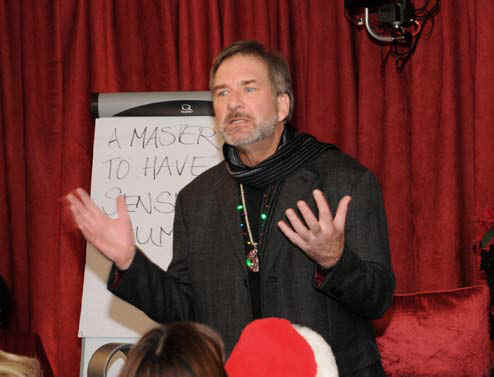 ADAMUS: Yeshua. Ah, you see. See how it changes it? The Yeshua
Composite.
ADAMUS: Yeshua. Ah, you see. See how it changes it? The Yeshua
Composite.
Now, we're in the holiday season. By the way, it's another one of our guests today β Jesus Christ β right here in Coal Creek Canyon! I'm serious.
LINDA: Marvelous.
ADAMUS: Yeshua. It's actually β let's call it more specifically β it's an energy from the House of Sananda that's here. Sananda, also known as Isa, that's right here, and why not? You're going to see in a minute, βHow did I miss that?!β
So, okay. So here we are in the holiday season. Today's guests β Jesus and our dear friend Nelson Mandela. Absolutely. What a great combination. We're in this time of the Christmas season and there's so much talk about Jesus. Actually, what I do and I've always liked about the Christmas, that's the one time of the year where they take Jesus off the cross and they put him in a little basket.
LINDA: Yeah! Woo hoo! (some chuckles)
ADAMUS: It's nice, much better than on the cross. (a few claps) The rest of the year? (he imitates being on a cross) Like that. (more chuckles) This time of the year looking up at his virgin mother and going, βThis is strange, mom.β (more laughter)
So I'm going to ask you, because so many of you walked with Yeshua. Yeshua is the real name of the one they call Jesus.
By the way, I have to stop and point this out. There's a Yeshua, the Yeshua that, you know, was around 2,000 years ago, and then there's Jesus. And mostly we have Yeshua here. Not so much Jesus.
Jesus is only, oh gosh, probably really about maybe 800, 900 years old. He's a lot younger than Yeshua.
Jesus is a composite just like Yeshua. You're going to see the difference though, because Jesus is a composite made up from the religions. The religions, they created Jesus. And so many people believe in it that it actually then happens. Just like you created an entity β composite entity β known as Shaumbra. Shaumbra's hanging around, drives a nice car, hangs out, has a few drinks now and then. Very cool.
So there's this Jesus composite as well, Jesus the savior, Jesus who's waiting, god knows for what β well, yeah, God knows for what β to save everybody, the second coming, which by the way never comes. And there's this Jesus who β real handsome white looking guy (some giggles) β always wears robes. Blue eyes. Yeah, Israel; blue eyes. Mm, I don't know.
There's this Jesus and he loves people who worship him. He loves people that say, βWhat would Jesus do?β He just sits there and smiles, you know; he never gives them answers, he just smiles. This Jesus β which is a composite consciousness made up of a lot of humans that believe in him β Jesus, he spends a lot of time walking on water. (laughter) Because that's what they believe. So every morning he gets up and walks on water. (more giggles as Adamus illustrates) Goes to the refrigerator up on the other realms, opens it up and says, βAh gosh, nothing to eat together today. Ohh, fish and loaves.β (laughter) βAnother day of fish and loaves.β Goes to a lot of parties. (someone says βThere's wineβ) The water into wine. It is absolutely real. I mean, I'm not making this up.
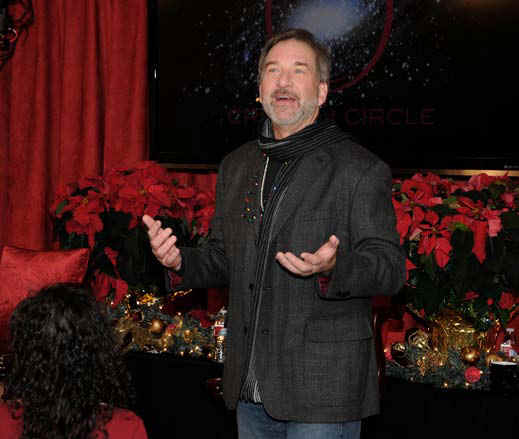 You can go to the other realms on the
other side and find
Jesus. Oh just listen for all the people β βOh Jesus!β β asking for
forgiveness for their sins. Jesus is like, βI don't know what to do. You're
calling out to me. You're asking me for forgiveness. I forgave you a long time
ago. I actually don't even know what you did, and you're asking for
forgiveness. Forgive yourself!β But
they don't hear.
You can go to the other realms on the
other side and find
Jesus. Oh just listen for all the people β βOh Jesus!β β asking for
forgiveness for their sins. Jesus is like, βI don't know what to do. You're
calling out to me. You're asking me for forgiveness. I forgave you a long time
ago. I actually don't even know what you did, and you're asking for
forgiveness. Forgive yourself!β But
they don't hear.
There's that Jesus wandering around on the other realms. (Adamus chuckles) Ohhh, dear Shaumbra, I'm so glad you're having fun. There are some that are online that are no longer online. (more chuckles)
LINDA: Yeah, a couple left the room too. Yay, you.
ADAMUS: And some that are just, they say, βHow could he be so sacrilegious, blasphemous?β Because it's just made up! Because then there is the real Yeshua who was flesh and bone, the Yeshua that some of you actually walked with. I mean walked with, touched, chatted with, told some bad jokes with, hung around with. Some of you were here at the same time. Maybe you never encountered this Yeshua, but you were always kind of walking with him in the other realms. There was this kind of whole agreement to come back together at this time.
Now, there are a lot of stories about Yeshua, but I truly believe, I trust that you know Yeshua, that you know the real story. So we're going to play a little game.
First, I ask you to feel into the Yeshua. Get out of your brain about all the stuff you heard. This is going to come spontaneous. I want you to feel how you really know Yeshua. Don't let your head block you here. Go to the heart. You know Yeshua. Why? Because Yeshua is a composite made out of you and me and a bunch of others. Yeshua was the biggest composite ever, in other words, more souled beings gathered together and said, βLet's create this composite.β Not a souled being. By the way, for those of you who are still online with us who are relatively new, yes, Yeshua, Jesus wasn't a souled being. It was a composite of all of you. It was about bringing the divine seed to this planet 2,000 years ago.
So let's β Linda with the microphone please β let's have a little discussion about Yeshua. Let's start out with β¦ hand the microphone to anybody. To anybody.
LINDA: Before they know what the question is?
ADAMUS: Absolutely. It's best that way. Good, good, good.
~ 1st Question
ADAMUS: So, would you tell me, what religion was Yeshua? Catholic?
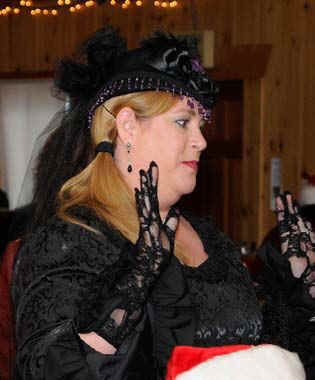 SUSAN: The mind answer or the β¦
SUSAN: The mind answer or the β¦
LINDA: You have to hold the microphone.
ADAMUS: Good. Hold the mike and please stand up.
SUSAN: Okay.
LINDA: Great outfit.
ADAMUS: Great outfit!
SUSAN: I don't know!
ADAMUS: Ohhh! Ohhh! (audience responds βOhhhhh!β)
LINDA: Ohhhh! Ohhh!
ADAMUS: Microphone. Outside.
LINDA: Ohhh!
ADAMUS: Three minutes.
Go ahead. What religion was Yeshua, Jesus?
SHAUMBRA 4 (girl): Uhh β¦
ADAMUS: That's all right. Just β¦
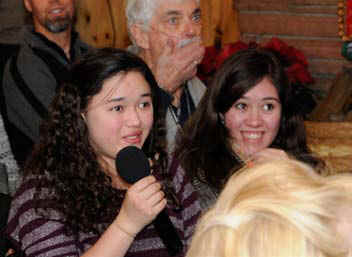 SHAUMBRA 4: Jewish.
SHAUMBRA 4: Jewish.
ADAMUS: Jewish! Kind of. Kind of. Yeah. Essene. Essene. Yeshua was born and raised an Essene, and in it you'll find a lot of the clues to his life.
First of all, his mother wasn't a virgin. You probably figured that one out. (some laughter)
SART: No! (more laughter)
LINDA: Going to be a long afternoon!
ADAMUS: Long afternoon.
However, the Essenes β¦ (he takes two M&Ms from a table) I'm taking one of each color just to show I'm not biased to the green, red. (giggles as he puts them in his mouth) Um, will you hold these? I've got to talk. (Adamus takes the candies out of his mouth and hands them to Paul)
LINDA: OHHHH!!
ADAMUS: I have to speak. I don't want to speak with my mouth full. (more laughter)
LINDA: Hey, there's some metal. You want to stick your tongue to it? (referring to an earlier conversation about the perils of licking freezing metal; more laughter)
ADAMUS: His parents weren't married, because the Essenes didn't necessarily believe in marriage. If you were a good Essene, a better Essene, you actually never got married. And I'll show you in a minute why that presented a lot of conflict for dear Yeshua.
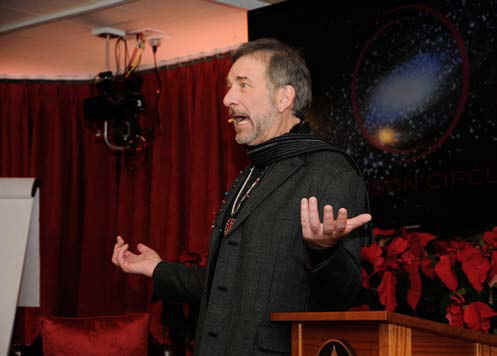 So the parents weren't married, but suddenly
Mary finds
herself pregnant. Oh! Of course, she had had intimacy with Joseph. Now, in the
Essene practice, the Essenes were like very strict, fundamentalist Jews at the
time. Very strict. So suddenly Mary finds herself pregnant. What to do? What to
do? Ah, well, not get married, of course, but to deliver the child and live in
a little bit of embarrassment. Not that it was totally forbidden, but if you
wanted to be a better Essene, you didn't fornicate at all. No, no, no.
So the parents weren't married, but suddenly
Mary finds
herself pregnant. Oh! Of course, she had had intimacy with Joseph. Now, in the
Essene practice, the Essenes were like very strict, fundamentalist Jews at the
time. Very strict. So suddenly Mary finds herself pregnant. What to do? What to
do? Ah, well, not get married, of course, but to deliver the child and live in
a little bit of embarrassment. Not that it was totally forbidden, but if you
wanted to be a better Essene, you didn't fornicate at all. No, no, no.
LINDA: Bummer.
ADAMUS: Yeah, well.
So Yeshua grew up a bastard, didn't really have a father β¦
LINDA: What?! Ohh!
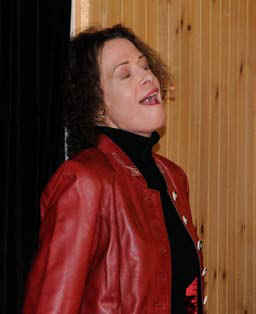 ADAMUS: Bastard is only a bad word in really the last 100 or
so years. It used to be many people were referred to as a bastard. Bastard
simply meant not having a father by marriage to the mother. That's all it
meant. It would be like saying, βI'm a lollipop.β You know, it didn't mean
anything. Now there's a spin on it β bastard β but Jesus was a
bastard. (Linda cries out again; some laughter)
ADAMUS: Bastard is only a bad word in really the last 100 or
so years. It used to be many people were referred to as a bastard. Bastard
simply meant not having a father by marriage to the mother. That's all it
meant. It would be like saying, βI'm a lollipop.β You know, it didn't mean
anything. Now there's a spin on it β bastard β but Jesus was a
bastard. (Linda cries out again; some laughter)
I want you to feel β¦
LINDA: My pain!
ADAMUS: β¦ a lot of the layers, the old layers that you have. And then I want you to feel back into how you helped to create your composite β this little bastard. (Adamus chuckles and Linda gasps loudly again)
It's your spin on β¦ (more laughter as Linda leaves the room) Oh, I amuse myself today.
Okay, microphone out to Linda, to somebody else. Microphone to the next. (she comes back in) Did somebody just run out the door? (more chuckles)
~ 2nd Question
Great. Next. Hand it to anybody. Yes. Hello, dear.
SHAUMBRA 5 (woman): Hello.
ADAMUS: So what did Jesus do for a living?
SHAUMBRA 5: He was a carpenter.
ADAMUS: He was a carpenter.
SHAUMBRA 5: Mm hmm.
ADAMUS: Really? Hang on a second. Give the microphone back to Linda. Take a deep breath. Feel for a moment. You personally knew Yeshua. Did you ever see him out there with a lathe and with sand paper and a saw and all the rest of that?
SHAUMBRA 5: No, but someone else said that about the bastard. (laughter)
LINDA: Ohhh! It's going nowhere fast! Brrrghh!
ADAMUS: Please note and please remember, go back into your helping to build this composite into your memories. Take a moment, just feel back, Yeshua, Yeshua β not Bible Jesus, but Yeshua, your composite β Yeshua was not a carpenter at all!
Yeshua wouldn't know how two rub sticks of wood together. First of all, there wasn't much wood in Israel at the time. Secondly, he lived in a commune, an Essene commune. The Essenes were very communal. Extremely. About the only work they really did was growing food so they could live. They were not merchants. They were not bankers. They were not tradespeople at all. They lived in communities of anywhere from a low of 100 to maybe 500 at a time. They were considered outsiders by the rest of the Jewish community. They were considered kind of the weirdoes. Oh! (Adamus chuckles) Here we are again! (laughter)
Yeshua trained to be β they actually didn't use the word 'priest' back then β Yeshua was training to be a teacher of the Yahad. A Yahad is the community school. They didn't call themselves rabbis. They didn't give themselves lofty titles like 'bishop' or 'pope.' They were simply β¦ the best possible interpretation would be maybe elder, but even that was not a word that was used because they never wanted to put themselves above others. So let's just call it a teacher. Hm. Hmmm. A lot of interesting correlations. A teacher.
He didn't work with wood. He didn't make chairs and tables and things like that. He studied a lot. He studied old scriptures. He studied the rules because the Essenes had a lot of rules. He didn't know how to use his hands. He wasn't a big muscular guy, and he didn't have a trade whatsoever. Interesting. Interesting.
So where did this come up with that Jesus was a carpenter? Well, it came up probably about five β¦ I'll take the M&M now.
PAUL: Oh.
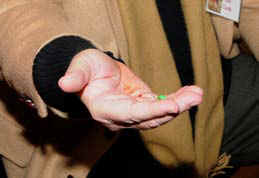 ADAMUS: Ohhh, look at your hands! (some chuckles) Ohh. How
about the camera over here. Look at β¦ oh, is that sweat or was that my spit?
ADAMUS: Ohhh, look at your hands! (some chuckles) Ohh. How
about the camera over here. Look at β¦ oh, is that sweat or was that my spit?
PAUL: Your spit.
ADAMUS: Oh, it was my spit. Okay.
So where did this come that he was a carpenter? Well, when they were putting the story together of Jesus, they said, βWell, we have to give him a trade,β you know, because there were a lot of trades back then. There were the bricklayers, the stone trade, there was the fishing trade and there was the carpenter, and they all had a lot of influence on the church at the time. So where do you think a little money came from by saying that Jesus was a carpenter? (someone says βThe carpenters unionβ) The carpenter's guild at the time. Absolutely. βOhhh! Yeshua was a carpenter. Sure! Here's some more money.β
Actually, probably the way it happened in that church meeting β (Linda hands him a tissue) oh thank you β in that church meeting, the churchy leaders were sitting around trying to figure out this profession. They had to name something. Of course, nobody knew, because this was hundreds and hundreds of years after. There was no Internet to record any of this. It was all handed down.
So they were trying to figure out what his profession was and one of the bishops said, βWhat would Jesus do?β (laughter)
LINDA: Ohhh! (audience groans and laughs) Ohhhh! Booo! Boo!
ADAMUS: And the other bishop said βHe was a carpenter.β Yes. Yes. (Adamus chuckles)
~ 3rd Question
Next. Microphone please. Microphone to somebody, anybody. Next question.
Ah, dear Michelle. Was Jesus married?
MICHELLE: Yes.
ADAMUS: Yes. Good. To whom? Hold that microphone right up to your mouth.
MICHELLE: Mary?
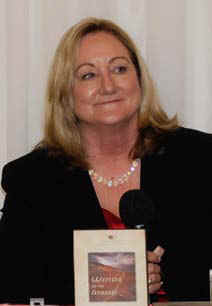 ADAMUS: No, I said was he married?
ADAMUS: No, I said was he married?
MICHELLE: Yes, he was, to Mary.
ADAMUS: Married to Mary?
MICHELLE: Yes
ADAMUS: Yes and no. Yes he was married, but no, never to Mary Magdalene. (audience say βAhhβ) Ahhh! Ahhh! Ahh!
Now, that creates a big problem. Here you have Yeshua studying to be like a teacher in the Yahad, in the school, the community school. That was his one focus β to teach and to help. He didn't care about anything outside of his community. I guess now they might call it a kibbutz. It was a little bit different back then.
He didn't care about the outside world. He didn't care about anything. But being a mortal, kind of, at least having flesh and bones that would eventually die, he had certain urges. (Linda clears her throat) Vince, Vince, right away, you're like βI understand that.β (some chuckles) He had certain urges and within the community was a beautiful young girl by the name of Ignes. Like Agnes, but Ignes, beautiful young girl. And one night sitting under the stars with β oh you know the story now. What's with your family here, you know? (Adamus chuckles, addressing someone who brought their children) They embraced their masculine/feminine energies, uh, together.
EDITH: Well put.
ADAMUS: Well put. Wasn't that delicate? Wasn't that delicate? They engaged in intimacy of the body.
Now, the good Essenes were not supposed to do this. The good Essenes did not eat meat whatsoever. It wasn't like the Essenes were forbidden, but the really good ones were vegetarians. And here we find now that Yeshua, trying so hard to be this eventual teacher β his one dream, one ambition is to be a teacher in the Yahad, in the community β and suddenly fornicating, hmm, and caught. (Linda sighs and audience says βAhhβ) Yeah, ahhh.
So what happens next? (someone says βShotgun weddingβ). Kind of, shotgun wedding. See, you're starting to get it. What happens next? Well, it was discovered and her parents weren't all too happy about this and immediately said, βYou must get married.β This was a huge change in Yeshua's plans, but the thing is, he loved Ignes. He loved her deeply and dearly. Either that or it was tremendous lust.
So, indeed, they got married. And indeed he had to start rethinking his role with the Essenes, because he's no longer that standard β the one who didn't fornicate, the one who didn't get married. Now he was just kind of an Essene commoner.
To make matters worse, oh, he felt so deeply in love with her, so deeply in love, and she became with child. And he started to allow himself to feel some of the passions that a human would feel. Rather than all this negating of passions that so many religions and spiritual groups do, he started to feel the passion of loving another human and eventually slowly loving himself.
What happened next? Tragedy. Ignes, with child, died. Died. The love of his life died, and he felt, with all he had learned in his studying, that he should have been able to heal her. He was angry because he felt some of the others in their community should have been able to heal. He felt that God had forsaken him, and it caused another great crash in his life. Now he had lost not only his position in the community because of fornication, but now he had lost his love. His love.
What happened next? Here he is, a very young man, barely seventeen years old, and suddenly everything is turned.
My dear friends, let's pause for a moment here before we go on to the next part. But can you feel it? Can you feel yourself in Yeshua? Can you feel the twists and turns in your own life? What maybe you thought were mistakes, what maybe Yeshua thought was a mistake at the time, which turned out to be perfect. Perfect.
So here we have a 17-year-old man angry with God, heartbroken, no longer a pillar in the community, no longer the one they thought was going to lead them into more rules and regulations. So he leaves, in the middle of the night. Where did he go? Where did Yeshua go?
Dear Linda, microphone please.
~ 4th Question
Please feel into this. You already know it.
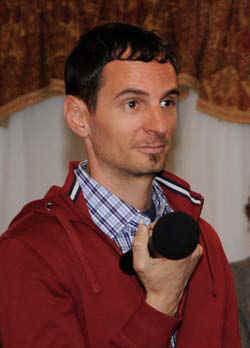 MARC: To the big city!
MARC: To the big city!
ADAMUS: To the big city. Sure. Get off the farm and go to the big city. Yes, in a way, you're right, absolutely, and other places. But just give it a shot. Where did he go?
MARC: What, specifically?
ADAMUS: Well, he was heartbroken. Imagine yourself for a moment. You're heartbroken β¦
MARC: The desert.
ADAMUS: Life has dealt you all of these bad blows. Where are you going to go?
MARC: The desert.
ADAMUS: The desert. The desert. Absolutely. You're absolutely right. Began wandering in the desert.
LINDA: Wow. Somebody's right. Woo.
ADAMUS: Began wandering in the desert. The Essenes were very familiar with Moses. The Essenes also β yes, very familiar with Moses β but they also had a different set of commandments. Understandings of Moses have been so distorted and rewritten over the years. The Ten Commandments actually had about 10,000 changes in the commandments since they were given.
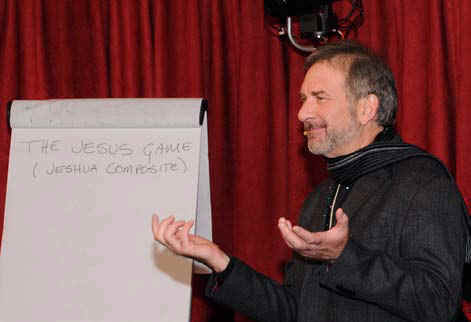 So he begins wandering in the desert and β back to Marc
β where does he end up, Marc? Where would you end up if you began
wandering in the desert?
So he begins wandering in the desert and β back to Marc
β where does he end up, Marc? Where would you end up if you began
wandering in the desert?
MARTY: Las Vegas. (laughter)
ADAMUS: Las Vegas. That's good! That's good!
MARC: Apparently in Las Vegas, right? (more laughter)
ADAMUS: And that's what makes Shaumbra special. Yes. Las Vegas. Good.
MARC: Ehhh, at a water β¦ (a few people say βOasisβ) Oasis, whatever you call it.
ADAMUS: Okay. That was the first night. After that. We got between 17 and 33 years old. Where β¦ just feel into it, please. Close your eyes for a second. Feel into it. Where did he end up, as the first major part of his journey?
(Marc pauses, then shrugs as if to say, βI don't knowβ)
No, don't β¦ just β¦ it can be any answer. Lie, but don't say, βI don't know.β Lie. Say, say β¦
MARC: I didn't say anything.
ADAMUS: India.
MARC: India?
ADAMUS: More specifically in the area known as Kashmir.
MARC: Okay.
ADAMUS: Ah, Kuthumi's backyard. Yeah. They didn't know each other. He ended up β¦ good. Thank you.
MARC: You're welcome.
ADAMUS: He ended up searching for answers, yes, wandering through the desert. Doesn't even remember how he got to India, how he got to this land. He was so destitute, so depressed he ended up there. And there, in wandering around India, he met some incredible teachers who literally shook down his world from everything he had learned as an Essene, everything he'd learned about history and God. It was a big shakeup, because he learned that God wasn't some guy up there. He learned that God wasn't an angry being who asked humans to worship. He learned that God was already within. That God was and had come to be what you now know as love and acceptance and compassion. It was hard for him, very hard for him to understand that, particularly with the bitterness of everything he had gone through.
He was searching for answers. He was desperate, aching so much in his heart. But what was really happening, my friends, is that in his search, theoretically thinking that he was searching for some relief just from the anxiety of losing his community and his wife β he was on a bigger journey. His real journey was about himself. Your real journey back then was about yourself. It wasn't about finding some philosophical answers. It wasn't finding yourself even just in a Mystery School or a monastery, although he ended up going there. But the original journey of your own divine seed was eventually about coming to you.
The story of Yeshua is your story. Some of you have gone through it a couple of times. Some of you have gone through it many, many times. But it was your story of life, of learning, sometimes of heartbreak and ultimately of discovery.
Yeshua traveled throughout these areas known as India and met with some amazing Masters. Learned how to breathe. How to breathe. That simple, but yet that elusive when he was an Essene, because it was so filled with rules and regulations, things you should or shouldn't do. Learned β¦ oh, next question to β Linda, hand the microphone to anybody. This is my favorite question. Two que- β¦ well, all in the same question. Good.
~ 5th Question
Did Yeshua β¦
ALAYA (woman): I just knew it! (she giggles)
ADAMUS: Did Yeshua have sex with others after he left his community, after he left the Yahad? Did he like just go lie with women? Or men β¦ or goats β¦ or sheep? (some chuckles and groans in the audience) You have to ask that! About 2,000 years ago you had to ask. You had to ask. Did Yeshua β where are the cameras? Make sure a camera is right on her face here so all the world can see this answer. Did Yeshua have sex?
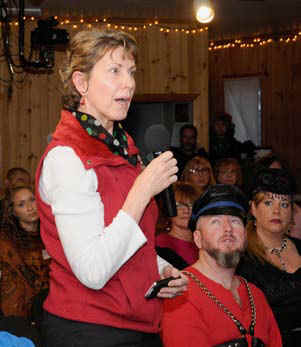 ALAYA: There is a quality to sex β¦
ALAYA: There is a quality to sex β¦
ADAMUS: Eh, eh, it was a yes or no.
ALAYA: I'm getting there. I'm getting there. That clears the pipes to ultimately find the divine within. And yes he did.
ADAMUS: Oh, he did have sex.
ALAYA: Mm hmm.
ADAMUS: Good. Often?
ALAYA: As often as possible. (some laughter)
ADAMUS: Okay. Did he prefer tall ones or short ones? (more giggles)
ALAYA: Tall ones or short ones what? (laughter)
ADAMUS: Good question. (laughter) Good question. So, yes, Yeshua had sex often. Did Yeshua masturbate? (Linda gasps and someone shouts βYes!β)
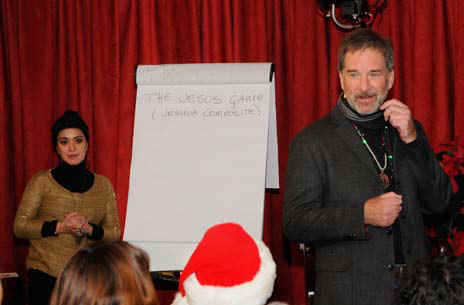 ALAYA: Yes.
ALAYA: Yes.
ADAMUS: Would you say that to the cam- β¦ say it to the camera.
ALAYA: Yes.
ADAMUS: Good. Thank you. We're breaking through so much old crap here today. Yes he did! Yes he did. Did he feel guilty about it? (she pauses; a few in the audience say βNoβ)
Have you ever felt guilty about it?
ALAYA: When I first started, yes. And then it wore off, and now I don't.
ADAMUS: Linda's back there freaking out. Why β¦ (lots of laughter)
ALAYA: Hey, I β¦ I β¦ I've been through β¦
ADAMUS: I think this is my favorite Shoud! (more laughter)
ALAYA: I've been through SES.
ADAMUS: Yes, absolutely he did, and he did and he did.
ALAYA: Yes.
ADAMUS: He had sex, he masturbated and he felt guilty. Well, like β¦ Cauldre, don't say that so fast.
ALAYA: Screw guilt.
ADAMUS: He had sex. He masturbate- β¦ Jesus masturbates. (some laughter)
ALAYA: Screw guilt.
ADAMUS: And he felt guilty about it until he realized the love of Self, the acceptance of Self.
ALAYA: Yes.
ADAMUS: Until he realized somebody else placed this crap on him that sex and playing with yourself under the table are bad. It took him a long time to get over it and realize that he could love himself. He could touch himself. He could feel himself. He could pleasure himself, and he could really love himself. Absolutely. And he would go on, my dear, to teach this to many, many others.
And when he sat in front of some of the groups, the reaction very similar β gasp! β βOhhh! You can't talk about this.β But he did, because he said, βDear brother, dear sister, it's about loving thyself. Then you will come to understand the love that your soul has for you.β Yes.
ALAYA: True. True. I'm my best date.
ADAMUS: You're your best date. Absolutely. You should be. And then you can be the best date to anyone else. Good.
~ 6th Question
Why β¦ next on the microphone. Oh, this is a good game today. Ohhh, this is having fun.
So why did Yeshua go back to Israel? Let me say first that after India he traveled throughout parts of Europe, France, of course. Stayed there a long time. He went to parts of what are now known as Germany and England β of course the names have changed β Spain, Portugal. He traveled. He traveled to learn more, experience more and meet others outside of his own little community where he'd grown up. But he went to experience all there was to learn and know. He went and visited the pyramids. Yes, absolutely went to Egypt. Spent a lot of time there.
Why did he go back to Israel? And please don't say to get his woodworking tools. (laughter) Yeah. If you wouldn't mind standing up.
SHAUMBRA 6 (man): He forgot his plane.
ADAMUS: He forgot his plane. Good. Good. (a couple of chuckles)
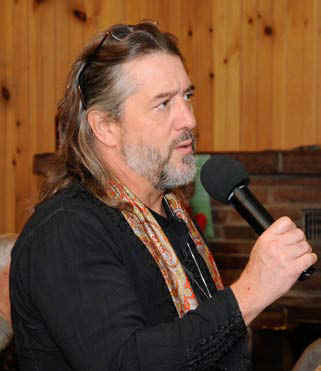 SHAUMBRA 6: No he went back to teach.
SHAUMBRA 6: No he went back to teach.
ADAMUS: He went back to teach. Why?
SHAUMBRA 6: Because he had good information to share with his fellow man.
ADAMUS: Good. But why go back there? It was hot and dusty and β¦
SHAUMBRA 6: It was home.
ADAMUS: Yeah.
SHAUMBRA 6: It was home.
ADAMUS: It was home.
SHAUMBRA 6: Yeah. And he enjoyed home.
ADAMUS: Mm hmm.
SHAUMBRA 6: Went back to see his family and friends.
ADAMUS: Ehh, they weren't so interested in seeing him, as a matter of fact. Not so much. No. The ones who had been in his community, no, actually β¦
SHAUMBRA 6: Who is this guy?
ADAMUS: β¦ didn't want to see him at all. Sound familiar?
SHAUMBRA 6: Yeah.
ADAMUS: See, yeah, yeah.
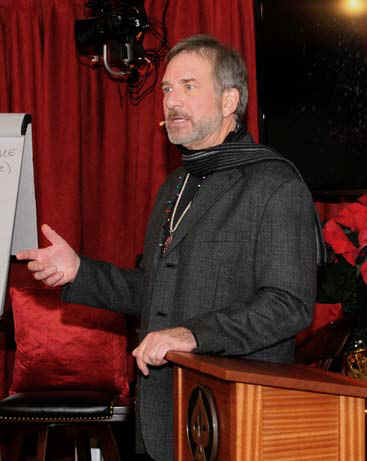 So, yes, there was a desire to go back home β thank
you, thank you for the good answer β desire to go back home. Part of his
journey to collect himself.
So, yes, there was a desire to go back home β thank
you, thank you for the good answer β desire to go back home. Part of his
journey to collect himself.
Have you had it where you've traveled to places, you've had an irresistible urge to go to Egypt or to go to South America or back to Europe, a tremendous desire to go back into your past, to see yourself now through different eyes. That's the biggest reason. Not so much to teach, but to see yourself from years ago or lifetimes ago to see how you've changed. And that's exactly what he did. And he went back a very different man.
Indeed, he went back to also do some, what you call, teaching, sharing with others. But he wasn't met with big open arms. He went back up to the area up around Magdel, which is the north end of the Sea of Galilee, and he was met with a lot of ridicule. But there were a few who listened. There were a few who felt an underlying dissatisfaction with the rabbis and the temple and the religious organizations at the time. There was a few that heard the word βI am God also,β when he stood in front of them and said, βI am God also.β The majority laughed at him, shunned him, threatened him, but a few heard it and they stayed. Some of them became his disciples.
And then more and more began to hear the word, because there were a lot of you who had come back at that time. You didn't consider him a savior. You considered him a friend. You didn't consider him to be some type of spiritual leader at all, because you knew he would never accept that role, never accept the role of leading a large group of people.
So, my dear friends, he went back to collect himself, to remember himself, but now in a new way, and in doing so met a lot of you once again.
You weren't in awe of him, because it was also you. Curious, yes. Fascinated, yes. You didn't know many people who had traveled to so many lands. But you felt a presence about him. You didn't know what it was. He didn't talk words like 'enlightenment.' He didn't talk even of the mysteries. He didn't perform any miracles to just fascinate people. But you felt his resonance.
Yeshua and Mary Magdalene
Now, leads us to a very interesting, very pertinent question. So here he was now with some friends that he would share time with. He met Mary Magdalene. They fell in love. Oh, such deep love. Shared a lot of intimate moments.
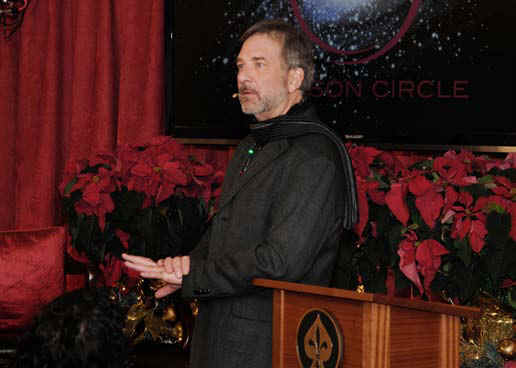 See, Yeshua, had learned a lot about this thing now called
Tantra in his journeys, and he knew how to share his body and his mind and his
love in a way that very few humans have ever learned since. Oh, because there
is so much chittering when you talk about sex, so much embarrassment. But he
knew how to love himself, and therefore how to love another.
See, Yeshua, had learned a lot about this thing now called
Tantra in his journeys, and he knew how to share his body and his mind and his
love in a way that very few humans have ever learned since. Oh, because there
is so much chittering when you talk about sex, so much embarrassment. But he
knew how to love himself, and therefore how to love another.
He met Mary Magdalene, who was a mess at the time. Ah, she had her demons. She β¦ eh, the story is contained in some of our other work,* but she was mess and he showed her how to love herself. It took a long time. She had a lot of victim energy. She had a lot of fear of men, the masculine energy; ultimately, really of the masculine energy within herself that was manifested in her abusers. But she finally came to terms with the masculine, the feminine and the divine within herself, and together they lived in love. They never married. Didn't want to marry. It had been such a horrific memory for Yeshua he never wanted to repeat that. But yet they also knew they didn't need somebody else to marry them or attest to their love. It was strictly between them.
*Further information from Tobias and Adamus on Yeshua and Mary Magdalene can be found in the Sexual Energies School (Tobias) and The Alchemy of Light & Dark (Adamus).
Question is, did Yeshua and Mary Magdalene have children? That's a big question. Everybody asks it. They write books about it.
I contend that they did, but it was after Yeshua departed the physical body. Hm. Hm. Figure that one out. Now, that should give you a little bit of a clue into yourself.
They did not choose to have children while he still walked the Earth. He knew it would end, and he shared that with Mary Magdalene. He said, βI'm here for a certain amount of time. I'll be leaving, but only leaving the physical. I'm still going to be here, and I'll show you. I'll show you what the soul, what the divine in love with itself can do, even after I leave.β
So it was a relationship of the physical and the spirit that occurred after Yeshua's death that actually impregnated Mary who had two children by Yeshua. Ah yes. Interesting, fascinating story. But my friends at Christmas time, the holidays, it's your story. The story here about how life continues even when there's supposedly death.
Question β big question. Linda, hand the microphone first, because this is the big question.
~ 7th Question
Question is β can the camera see back there? (someone says βSureβ) Good. Question is β¦ oh good! Question is, did Jesus fail? Did Jesus fail?
SUZY: No.
ADAMUS: Eh, before you ans- β¦ oh, no is your answer?
SUZY: No, he did not.
ADAMUS: No. But there are those that argue that Jesus, this Master, this divine being failed because he allowed himself to be put to death. He failed because he could have or should have been able to overcome this or been able to overcome his enemies or those that sought to kill him. He failed because he died instead of lived. He failed because of the blood and the suffering and the pain; that a true savior would not have died. A true savior would have perhaps lived in a mansion, had all sorts of guards and would have never allowed himself to die like that.
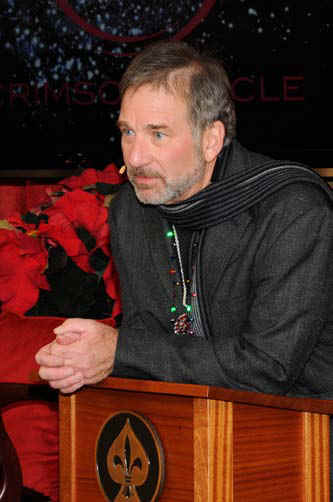 There are those who say that look at the difference between
Muhammad and Jesus. Jesus failed. Muhammad just ascended. He didn't have to go
through all that. That Jesus could not come to terms with the energies, that
Jesus perhaps was some type of false martyr. There are those who say that and
there are some who believe it β the failure of Jesus. Jesus who comes to this
Earth β whether you think in terms of Jesus or Yeshua β that comes here to show
us the way, and ends up nailed on a cross, which, by the way, did happen. For
those who don't think it did, no, he was nailed on a cross.
There are those who say that look at the difference between
Muhammad and Jesus. Jesus failed. Muhammad just ascended. He didn't have to go
through all that. That Jesus could not come to terms with the energies, that
Jesus perhaps was some type of false martyr. There are those who say that and
there are some who believe it β the failure of Jesus. Jesus who comes to this
Earth β whether you think in terms of Jesus or Yeshua β that comes here to show
us the way, and ends up nailed on a cross, which, by the way, did happen. For
those who don't think it did, no, he was nailed on a cross.
So Suzy you say, no he didn't fail. But explain why.
SUZY: Well, he was a man, and β¦
ADAMUS: Well, that's a failure. (laughter) He was man and β¦ and β¦
SUZY: And I grew up very Baptist so I know that he died for our sins.
ADAMUS: Do you still know that?
SUZY: No.
ADAMUS: Oh good.
SUZY: I'm not going to Baptist heaven, so β¦ (some chuckles)
ADAMUS: Yeah. Good. Good.
SUZY: I'm going to my own place. Well, he realized, I think, that we are all God also, and so he just helped us get there a little faster.
ADAMUS: But why the death? To me that sends β¦ well, it could be a bad signal for somebody on the path. (some laughter; Adamus chuckles) Kind of, I don't know. Maybe I'm a little sensitive today. But wow, look what you get when you become a Master! Yeah.
So how is that not failure?
SUZY: Because he rose again in three days and he ascended then. I mean, he didn't β death didn't conquer him.
ADAMUS: Conquered the body, though.
SUZY: The body, yeah.
ADAMUS: Yeah.
SUZY: But not his spirit.
ADAMUS: But what was the point in allowing himself to be captured? Actually, he wasn't even captured. He just gave himself up. And then he made it worse. He provoked the Romans. He could have gotten off. He could have walked away. A little payoff would have gone a long way, if you know what I mean β a long way β but he provoked them. What was that about?
SUZY: To make a point.
ADAMUS: Of?
SUZY: That we could all do that for ourselves.
ADAMUS: Provoke the Romans?
SUZY: Yeah! (she giggles; some laughter) To wake us β¦
ADAMUS: Why β¦
SUZY: To wake us up and you know to β¦ to β¦ well, to wake us up and β¦
ADAMUS: Let me be real candid about this. Are you going to die for your enlightenment? (someone says βMaybeβ)
SUZY: Some people do.
ADAMUS: Some people do.
SUZY: It's a choice.
ADAMUS: Would you?
SUZY: I don't have to.
ADAMUS: Good. Good. Thank you.
And I'm going to continue the question, but I want a few more answers. Thank you. I know it's a very tough question. I'm asking you, the world, anybody listening in who wants to, isn't this failure at some level β to end up on the cross, to have a spear in your belly, to have all this suffering β wasn't that failure?
I ask at a very deep level within each and every one of you because Yeshua is a composite, and it's part of you. And if he was put to death, in a way you were put to death. And if he didn't stay as a Master in the physical, maybe you aren't going to stay as a Master in the physical. If he martyred himself, maybe this is what your mastery looks like β martyring of self?
Linda, microphone to somebody else, same question.
LINDA: Ooh, somebody raise your hand. Make it easy.
ADAMUS: Was Yeshua a failure? And we have to address this, my friends, because it's thick. It's in the air. It's the elephant in the room that nobody wants to talk about. It's this whole fabricated story of Jesus, but there is this story of Yeshua, the composite being, who, in a way, was in search of your mastery, because it's part of you, but was put to death.
Next. The answer.
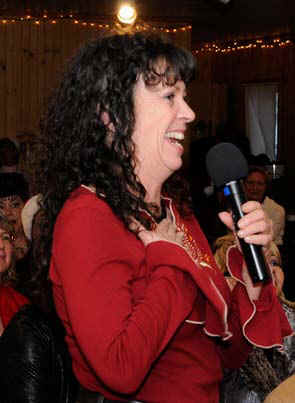 JOANNE (woman): I think maybe that he β¦
JOANNE (woman): I think maybe that he β¦
ADAMUS: Would you mind standing?
JOANNE: Oh.
ADAMUS: Yeah. Thank you.
JOANNE: He provoked them so he could kind of prove to us that there's life on the other side, that we actually maybe the body does die.
ADAMUS: Yes.
JOANNE: But you continue on. That's my feeling.
ADAMUS: Yeah.
JOANNE: So.
ADAMUS: So what happened to him after he died? He had a little love making with Mary Magdalene after he died, but you don't hear too much about him after that, what he did after that.
JOANNE: That's true. I think the disciples, well, they got scared for a while and hid, but I think they still made the point of β¦
ADAMUS: A few of them got beheaded, but let's not pay any attention to that fact. Yeah.
JOANNE: So have we all, so β¦
ADAMUS: Yeah.
JOANNE: But that's what I feel β¦
ADAMUS: That's why I'm wearing this protective metal scarf today. (some chuckles)
JOANNE: So and they finally, some of them finally got their strength back, because they would speak with Yeshua. Still he would visit them in the spirit, and I think that's how it kind of continued on.
ADAMUS: Kind of.
JOANNE: Kind of?
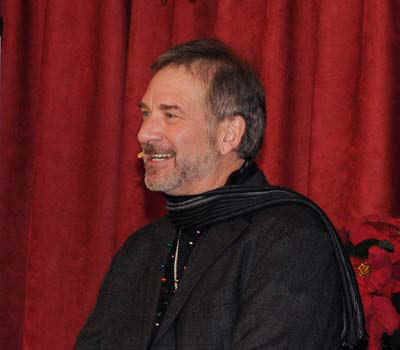 ADAMUS: Kind of. It's like the story we have going on today
is that, is that a good thing or not such a good thing?
ADAMUS: Kind of. It's like the story we have going on today
is that, is that a good thing or not such a good thing?
JOANNE: I think it brought β¦
ADAMUS: The story of Jesus.
JOANNE: Well, it brought the Christ seed consciousness to Earth.
ADAMUS: Yes.
JOANNE: And some people took it and ran different ways, but we're all at different levels maybe?
ADAMUS: I would argue, just to be β¦
JOANNE: Okay.
ADAMUS: β¦ argumentative.
JOANNE: That's okay.
ADAMUS: If it brought the Christed seed to Earth, amazing thing β βOh, this has been planned for a long time, we're all going to come back and sprinkle the Earth with our Christ seed; we're going to create this composite that is us all put together because it creates such an amazing bond with us, and we come down here 2,000 years ago, we're born into a physical body all aroundβ β and then the Christ seed dies?
JOANNE: (pausing) To me, I don't feel it died at all. I just feel it's a different way to express himself.
ADAMUS: The template of the Christ seed, the character, Yeshua, he dies at the end of the story.
JOANNE: Correct.
ADAMUS: And I haven't read Bible: Part Two, like the story doesn't keep going on. It just ends. It ends.
JOANNE: Okay. So I guess I don't understand the question you're asking me.
ADAMUS: The question I'm asking all of you is β I'm going to title it very boldly β βThe Yeshua Failureβ β question mark. βThe Yeshua Failure?β Because every β¦ thank you.
JOANNE: Okay.
ADAMUS: And you know this is a tough one. There is that within all of you β The Yeshua Failure. It's, yes, it's a beautiful story that you talk about, coming to Earth and being a Master and even what I would call the more real iteration of Yeshua, rather than Jesus the Carpenter β really?
By the way, Yeshua, he didn't grow up in this poor family and this whole story of the nativity and no room at the inn, none of that. It makes a great story, but he grew up in the Essene community. They weren't rich. They weren't poor. They really didn't care that much about money. They liked to eat. They pretended they didn't like to have sex, but they really did. (a few giggles) And they were very strict. Very strict. But it wasn't this life as a poor carpenter. No, not at all.
So I bring this up as kind of one of those hurdles we need to cross over. There's a certain feeling of failure. It's sitting somewhere in you. It tends to overshadow the beautiful knowingness that we talked about in our last gathering. But if a Master was going to come back now, a Master like Yeshua, would it be advisable for that Master to get killed? Other than making the news, but does that really serve the purpose? Can anybody understand what was the purpose?
Yeshua, your 33-year-old creation, what was the whole thing about dying on the cross? And Linda pass it to any hand that goes up or any hand that stays down. David. Yes.
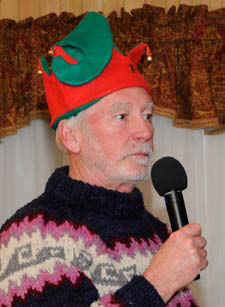 DAVID: Martyrdom. It got the word out.
DAVID: Martyrdom. It got the word out.
ADAMUS: Martyrdom. Not a lot, but eventually later on. Eventually later on. It wasn't a lot of news about it back then. The Essenes back in the community, back in the Yahad, was like, βWell, he was asking for it. Look, he was fornicating when he was young. He, you know, gives up his family and the community and goes wandering god knows where. No wonder he got killed.β Kind of. Kind of. There wasn't a lot of tears. He had a small group of followers, friends, and there was mourning there. But it took centuries really for this to get going. Yeah.
And is it such a good story? Interesting story, but is it such a good one? He dies on a cross. Yeah. No. So can anybody understand why that kind of ending back then? Again, this is your composite. What purpose did it serve?
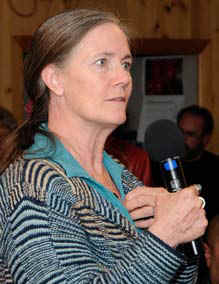 SHAUMBRA 7 (woman): Well, I think that he wanted to hand the
torch to us, that if he stayed alive we would keep following his word rather
than our own. And I think that's probably what he learned on his journeys was
that this was his story and his truth, and he wasn't afraid of the Romans
because he was living his truth. And if that caused him to die, he wasn't
afraid of that and so we got to all see that and also understand that it was
our story from then on. Though it got lost, of course.
SHAUMBRA 7 (woman): Well, I think that he wanted to hand the
torch to us, that if he stayed alive we would keep following his word rather
than our own. And I think that's probably what he learned on his journeys was
that this was his story and his truth, and he wasn't afraid of the Romans
because he was living his truth. And if that caused him to die, he wasn't
afraid of that and so we got to all see that and also understand that it was
our story from then on. Though it got lost, of course.
ADAMUS: Best explanation I've heard in a long time. Yes, and please an Adamus Award for that. Thank you. (audience applause)
Not that it was the best ending in the story, but Yeshua got to the point where he was feeling that the disciples, the friends, others were becoming obsessed with him. You were becoming obsessed with yet another false idol now in the name of Yeshua. Felt that so many were hanging on every word. And yes, initially, there weren't many gatherings, and then got to be more and more. Felt that once again you were deferring to something else.
And he warned his disciples at the time. He said, βIf you keep this up, I'm leaving.β They thought he meant like going back to India or something. He said, βIf you keep it up, I'm checking out, because I am here to tell you the God is within you. Don't look to the God within me, but the God is within you.β
And he felt that ultimately it would be best to go. He had told Mary Magdalene right from the start it wouldn't be a long-term relationship. They weren't going to be grandparents in rocking chairs looking at old stone carvings of their younger days, that he was going to be leaving quite soon. And in doing so, he actually never really wanted to dramatize it. He didn't want to be a martyr, but he did want to prove a few points, and one of them was to show his followers at the time that life does go on.
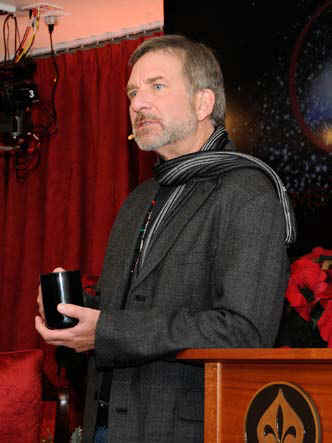 More important than even his
Ascension β¦ because, you see,
some of the disciples at the time thought they were just hallucinating, you
know, having visions or whatever. Drank some bad wine and suddenly Jesus
appears. Some of you have had that. But he felt the true manifestation that βI
liveβ was impregnating Mary Magdalene after he left. That that would be the
proof that life does continue, that you can
ascend with your body, that it's not just an apparition, a vision of the
disciples on the road suddenly seeing Yeshua. But, βI will make this child with
Mary and then you will see that life goes on. Then you will see that you can
take your body with you.β
More important than even his
Ascension β¦ because, you see,
some of the disciples at the time thought they were just hallucinating, you
know, having visions or whatever. Drank some bad wine and suddenly Jesus
appears. Some of you have had that. But he felt the true manifestation that βI
liveβ was impregnating Mary Magdalene after he left. That that would be the
proof that life does continue, that you can
ascend with your body, that it's not just an apparition, a vision of the
disciples on the road suddenly seeing Yeshua. But, βI will make this child with
Mary and then you will see that life goes on. Then you will see that you can
take your body with you.β
That story wasn't written about so much, hm, or at all. That would have been a far better story than just, you know, getting up from the β¦ and walking around and meeting a few disciples. That's the real story of life, maybe the real Christmas story that should be told.
So let's take a good deep breath with the Jesus story, the Jesus Game. Yes, question. Microphone, please.
ALAYA: How was it proven that Mary was impregnated by Yeshua? How did β¦ how β¦ I'm sure she β¦
ADAMUS: Just ask her.
ALAYA: Well, but how β¦ I'm sure she was asked about who β¦ how she became pregnant.
ADAMUS: Yes.
ALAYA: How did β¦ I mean, didn't anybody doubt her?
ADAMUS: Oh, think of it by your terms today. So here Yeshua had been gone for about four months and suddenly she says, βI'm pregnant. Missed my monthly period,β and you can imagine the others, particularly the other women, were like βYeah sure. Really? He just leaves. He just was executed. He went through all that, and suddenly you're out bopping somebody else?β That's exactly what they thought. They didn't say it quite like that. They talked a little different back then. Bop, you know, doing it, having a relationship with somebody else.
And sure it caused a lot of questions, a lot of gossip in the community about it, but those who truly knew Mary Magdalene β the new Mary Magdalene, not the old Mary Magdalene; the reformed Mary Magdalene, as we used to call her β understood she would never lie about that. And then when the baby β babies β came out, anyone who had eyes to see could see it looked like Yeshua and had that kind of Yeshua glow about it, you know, the children.
The children didn't live very long. They died after Mary got to France. They had a very difficult time because they were the offspring of two very amazing beings, including one that wasn't in physical body. He was light sperm, so it was a little bit different than regular. (some laughter) It was! (Adamus chuckles)
So they had a very difficult time handling the energies. They didn't last long, and it wasn't β¦ it was said that it was a flu or some disease going around at the time that did them in, but it was just they could not handle it.
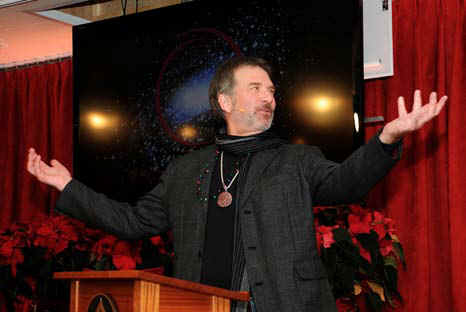 Similar to a lot of the
Crystal Children coming in right
now. They come in so clear and so unfamiliar with the ways of the Earth that
they come in and they end up with things like ADD and some of the other
sensitivities, allergy sensitivities, autism and things like that. They're
having a very difficult time adjusting to this energy.
Similar to a lot of the
Crystal Children coming in right
now. They come in so clear and so unfamiliar with the ways of the Earth that
they come in and they end up with things like ADD and some of the other
sensitivities, allergy sensitivities, autism and things like that. They're
having a very difficult time adjusting to this energy.
And guess what? So are you! You who have β many of you have been here a thousand or more lifetimes and have been very familiar with the ways of this Earth β you're having a difficult time with it. There's so much energy coming in right now, and it's affecting you, as we heard a couple of people talk about recently. Yes, the last year, the last week β crazy energies. Wait till next year. (Adamus chuckles) Ahh, but you are in the perfect position and this is exactly why I went through the whole Jesus Game today and brought it to this rather dreary end of dying on the cross. Maybe it wasn't the best thing, but it seemed to be appropriate at the time. It was a different time than it is now, but you've carried that with you ever since.
The Big Question
You have this question that bounces around within you, and it's on every level. It's on your very practical human level. It's on an esoteric, spiritual and master level. The question you ask yourself, and Linda if you would write this down please, and you're going to be maybe a little confused at first, and you're going to walk away saying, βI don't understand what he talked about today. This thing with the Jesus Game, and I guess that was kind of interesting. And then he said I walk around with this question, but I'm not sure I do.β And then a couple of days from now you're going to remember that you do.
How does it end? That's my question today. That's why we played the Jesus Game. How does it end? Big question, and it's going to be a big question into going into next year. How does it end?
It's a question every one of you have had on a very practical level. βHow does it end? Am I 65? 85? Do I ever get to that enlightenment? Do I get to the enlightenment and do I leave the planet? Do I get to the enlightenment and suddenly some groups comeβ β I don't want to mention any β βsome religious groups come chasing after me, kill me? Am I going to be a martyr? Am I going to be so different than anybody else that I have to take myself off this planet, because they're coming to follow me and worship me and do all those gross things and not leave me the β ahem β alone to just be a Master?β
Question β and really the theme of this Shoud is β how does it end?
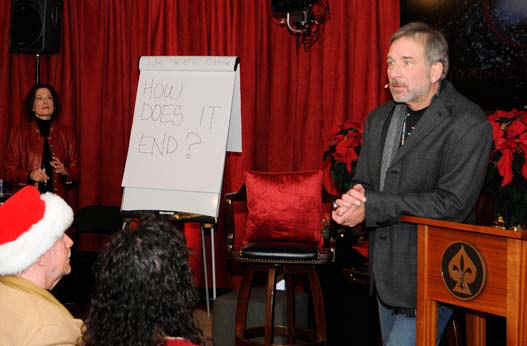 I'm not going to give you the answer. That's actually for
you to bounce around in your belly, your heart and your mind between now and
our next gathering. And we're going to open our next gathering after my
monologue, we're going to open it by coming back to it. How does it end? What
does that mean to you? What have you been projecting, thinking, assuming about
that? I will give you a little bit of a clue.
I'm not going to give you the answer. That's actually for
you to bounce around in your belly, your heart and your mind between now and
our next gathering. And we're going to open our next gathering after my
monologue, we're going to open it by coming back to it. How does it end? What
does that mean to you? What have you been projecting, thinking, assuming about
that? I will give you a little bit of a clue.
How does it end, what you've been contemplating? How do you die? How does it end? Is going to be nothing like you've ever thought. Nothing.
So we'll get into that in our next Shoud. Doing a little preselling of our next Shoud. I'm competing with the other Ascended Masters, got to get big numbers here. (some laughter)
How does it end? What have you been thinking about or fearing about? How does it end?
That's why we went through the Jesus Game today. It was all a lead-up to saying look what happened to him, and how is it going to end for you? What happens when you cross over, whenever that happens to be? What next? Ah! It'll be a great Shoud.
So in the meantime, let's talk a little bit about β¦ um, let's do one thing very quickly. I mentioned that Yeshua went back to Palestine β eh, politically incorrect β Israel. Went back to Israel after his many, many years away. You ever notice there was a huge gap in the Bible between the time he was about 14 and 33. Why haven't more people said, βWhat happened?β He wasn't making chairs and tables or even big crosses. (some groans and laughter) We can joke about it now, because we know he had sex. (laughter)
So what were these lost years? How come there's no account for it? It was just kind of glossed over. Well, yeah, you know, he's turning over tables in the temple when he's 12 and then you don't hear from him till he's 30. That's a pretty long gap there. Yeah.
Yes. Question or comment.
SHAUMBRA 8 (man): It's a comment and the comment is, because it didn't fit the plan for the proselytization.
ADAMUS: Exactly. Exactly. It didn't fit the plan.
Why are humans so asleep β not you, but humans in general β so asleep that somebody hasn't just had an absolute fit about this saying, βI'm not going to go to communion until I know what he did from 14 to 30. I'm just not going to go to confession either. Never β¦ tell me or else.β (someone says βThey don't knowβ) Well, they don't know. That's absolutely right. But they don't even make up a carpenter story or something like that. They don't even make up a story that he went and worked for some charity for a while. (Adamus chuckles) Anything. Anything. They just β gasp! β βLet's not discuss it.β It's just a little odd, and these type of things cannot and will not continue in the future. They can't. They can't.
I'm amazed that otherwise good humans have just said, βOh, okay. Well, yeah, no written record.β These type of things, the awareness is getting too high right now. These type of things can't go forward. People are going to ask the questions now. They'll be bold. They'll come forth and say, βNo, no, no, no, no. That doesn't make sense, the whole virgin birth thing. Have I got a story though, fornicating from the other side. Now that is a good answer. That's, yeah, that's a story.β That'll raise some eyebrows. Make a good Hollywood movie. (some giggles) It's heaven within you. So β¦ (continuing laughter) Kind of a double meaning there, ladies and gentlemen. (Adamus chuckles)
2014
So here's what I'd like to do. Let's do a β¦ I'm going to do this out of order. Let's start with this β 2014. We're going to talk about it in our upcoming gathering next month. (referring to the ProGnost event) As I said in our last gathering, the year of tough love. It's also going to be the year of discovering gifts within yourself; tough love, gifts within self.
There are some things within you, already there. You created them; you made them. They're part of the Christ seed energy, and they're just β they're like crystals, well, crystals within you. They just haven't been brought forward for a lot of reasons we don't need to get into, but gifts and talents that are yours. Nobody's giving them to you. They're going to amaze you. Things that you didn't even know you had β understandings, talents, creativity β that are going to be, let's call it, pushed forward. They're going to come out. Times will be tough, and this will cause these beautiful things within you to finally come out. A little nudging is going to bring them out.
Let me β I'm hopping around here but on purpose β let me say one thing about creativity, because this ties into things you're going to discover, gifts that you've always had that are just going to amaze you. And then it'll amaze you that you didn't bring them out sooner. But understandings and capabilities and talents that are sitting in dormancy right now, for whatever reason, that are going to come out.
~ Creativity
Let me say one thing about creativity. Creativity is about trial and error. It's not about getting it right the first time. Creativity is trial and error. Divinity is kind of also, but they're tied in together.
There is a human desire to get it right all the time every time or don't do it any time. In other words, guaranteed success that's it's going to work. The truly brilliant creative ones are the ones who are willing to make mistakes. Tesla β a lot of mistakes along the way. Many of your other famous inventors and scientists and progressives made a lot of mistakes.
We sit around in the Ascended Masters Club and we joke about it. We say, βA really successful human is one who gets it right about eighteen percent of the time.β And how much percentage does that leave to not get it right? Add quickly. A lot. Just a plain lot. I'm not saying you're locked into that. You might get it right 50 percent of the time. Maybe 70, I doubt it, and it's not important.
Creativity is a matter of trial and error. A creator doesn't try to get it right. Only the human, only a mental being tries to get it right. A creator is simply creating. It doesn't matter. You could say in a way there's no judgment, but there is actually no big tie-in to the outcome. βI create β oh, that worked great. I create β pfft! Wow! That didn't manifest the way I quite had hoped.β
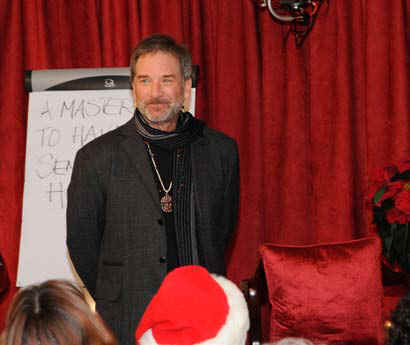 The funny thing is the enlightened creator understands that
it did manifest somewhere, maybe off
in another dimension, perfectly. It just didn't come in here quite right. Why?
Because the energies are challenging, difficult, thick, nasty, wicked,
associated with other people and everything else, and sometimes they just don't
poof in here right. It doesn't mean you got it wrong. It just means maybe you
were ahead of your time, maybe you like creating in these other realms, and
maybe it just wasn't quite the right ingredients. So the real creator creates
again, out of joy for the experience, without worrying about was it right or
wrong.
The funny thing is the enlightened creator understands that
it did manifest somewhere, maybe off
in another dimension, perfectly. It just didn't come in here quite right. Why?
Because the energies are challenging, difficult, thick, nasty, wicked,
associated with other people and everything else, and sometimes they just don't
poof in here right. It doesn't mean you got it wrong. It just means maybe you
were ahead of your time, maybe you like creating in these other realms, and
maybe it just wasn't quite the right ingredients. So the real creator creates
again, out of joy for the experience, without worrying about was it right or
wrong.
So creatorship is a matter of trial and error. A true creator takes joy in both, but is ecstatic when they actually get it right β what they feel, what they say is right, it manifests here in this reality kind of like they want it to β eighteen percent of time. Pretty good. Maybe you can do better.
Going forward into next year β and this will all tie together; it doesn't make sense right now at all, but one of these days you're going to go, βOh! Now I understandββ going forward into next year is both the year of tough love, the year of discovery of latent talents and gifts within yourself that will β I'll put it in writing and guarantee your money back on this Shoud β that it will blow you away. It will literally blow you away next year, what has been latent in there.
~ Trust
The other thing about next year, and it's an old topic, but we have to cover it again and probably again after this, is trust. Next year, in particular β and this is not about worry but it is about awareness β next year you're going to have one thing to fall back on, and it's you. And it's you. That requires trust. If you're out of trust with yourself and that's the only thing you have to fall back on, oh, it's going to be a long, long way down.
But if you have yourself to trust. Now, trust is a tricky thing. A lot of you say, βOh yeah, I trust myself.β Not really. No, you say that, but you really don't. You don't believe me? Take a look at your actions and reactions.
Trust is kind of a surrender, in a way, but trust is β¦ trust, for some of the Masters, has been, βI don't have anything else. There's nothing left. That's all I have. I can't even effort into it. I can't make myself believe in, but that's all I have because everything else is gone.β That's when you discover real trust, by the way. Yeah.
Next year it's going to be trusting yourself.
I can tell you this and you're not going to necessarily believe it, but just do it. Just trust yourself. Even when you think it's wrong, it's still right. It really is. Even when you think, βOh, I turned the wrong way; I did the wrong thing.β Look at Yeshua, for an example. Had romance one night under the stars, got a little carried away, couldn't keep it in the robe, and suddenly β¦ (some chuckles) Suddenly, it blew his whole career of being a teacher at the Yahad. It messed it up. Oh, did he feel bad. βOh geez! Egh! I hate that thing down there! Look, it got me in so much trouble.β It was actually divine, because it got him out of that commune, got him out of that community. Oh my god, that it was so boring there.
And then when his first wife died, his only wife died, and there was all the feelings of guilt β βI should have been able to heal her. I should have known the right herbal chant to do,β or whatever, βand God,β you know, βdidn't listen to me, so I must be a sinner.β How hard that was on him. But yet it was divine. That got him out of the community. That got him off learning. That was you! That was the Christ seed at work. And you think it was easy for Yeshua to trust himself, to say, βOh yeah. Yeah, that's exactly the way I planned it. Uh huh, uh huh. Yeah.β (some laughter) βYeah, threw me out of the place and my wife dies and my life is ruined. But, oh sure. That's me. I'm a creator.β But actually he was. Actually, he was.
There was enough built-in remedies in case he got stuck in this really boring community; there was enough built-in remedies, even the angst that he went through that caused him to start his search. What else would have done it at the time? Sometimes β¦ am I talking too much? (a few in audience say βNoβ) No. Good, because I'm going to keep talking. (Adamus chuckles)
Even as difficult as it was with the death of his wife, that was not an accident, so to speak, and if he had trusted himself, he would have understood the wisdom. If he had trusted himself, she would have never died, actually. So a lot of things that happen don't have to happen. Jesus did not have to die on the cross if enough people had trusted themselves. It wouldn't have had to happen that way.
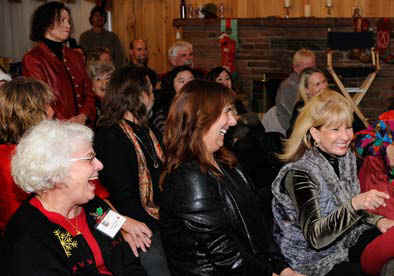 A
lot of things in your life won't have to happen if you trust yourself. If you
absolutely emphatically βI've got nothing else in my
lifeβ trust yourself. It will change the experience. The outcome, the end
result is still going to be the same β enlightenment. I would say most of
you have made a commitment to it, you've got a pretty good shot at it in this
lifetime, pretty good chance. At least a three percent chance in this lifetime.
(laughter and groans) That was a joke. You have a 100 percent chance. Yeah,
yeah. Yeah. There is that potential.
A
lot of things in your life won't have to happen if you trust yourself. If you
absolutely emphatically βI've got nothing else in my
lifeβ trust yourself. It will change the experience. The outcome, the end
result is still going to be the same β enlightenment. I would say most of
you have made a commitment to it, you've got a pretty good shot at it in this
lifetime, pretty good chance. At least a three percent chance in this lifetime.
(laughter and groans) That was a joke. You have a 100 percent chance. Yeah,
yeah. Yeah. There is that potential.
Most of you seriously have an excellent, excellent, excellent potential for realization β I don't even want to call it enlightenment; realization β in this lifetime, if you trust yourself.
I can hardly teach trust. I just can hardly do it. I can say the words. We can have some trust merabhs and all the rest of that, but if you don't trust yourself, you don't trust yourself.
What tends to happen when you don't trust yourself β when you're on this path, when you're coming into your enlightenment and you don't trust yourself β everything will be ripped away so all you have left is you. It's not such a bad thing, but it doesn't have to happen that way. It doesn't have to happen. You can actually just trust yourself.
And not your past life self, not this golden angel. I'm talking about trusting you that's sitting here right now with that great smile on your face β trusting that. Trusting this that you have, this amazing beautiful being looking younger all the time too, I must say. I don't know what you're doing, but bring me along!
That amazing trusting yourself. So it doesn't have to go into the rip down experience. It doesn't have to go into this whole scenario.
Some of you feel like you're this kind of an asteroid heading to some type of strange conclusion. That's why I say how does it end? How does it end? And you're like, βOh, I'm out of control. I feel myself jettisoning towards this wall, and suddenly boom!β It doesn't have to happen that way. Trust yourself β whoosh! β changes all those dynamics. I can't teach trust. I can only ask you to feel inside.
Now, you feel inside, you say, βOkay I'm going to trust myself,β two things happen. First of all, you say, βWell, I screwed up in the past.β No, I just told you. Creatorship is about trial and error. You didn't screw up. It was an experience. Secondly, the other alarm goes off, a bigger alarm, βYeah, I can trust myself, but what about them? I can't trust others, because they're going to screw me over. The minute I let my defenses down, they're going to come in. They're going to take my house, my money, everything that I have. Manipulate me, take advantage of me.β No.
When β you can write this down also β when you trust yourself, suddenly you trust everyone else. Suddenly, you trust everyone else. Actually, truth be known, is when you trust yourself, the word 'trust' goes out of the dictionary. It doesn't even apply anymore in mastery, enlightenment. Somebody comes to talk to you about trust you don't even relate to that word, it's so old and foreign. βTrust, oh, what an old word.β You don't even have to think about trusting others. It's implicit. It's already there.
And I know, I can hear some of you, particularly online, screaming, βBut I tried this before and the minute I let my guard down, they took advantage of me.β Well, (a) you didn't let your guard down; (b) they can't take advantage of you, unless you're kind of in that victim energy. They can't.
When you trust yourself, you will never be in the situation where you have to worry about trusting others or not trusting them. You're never in that situation. It just doesn't even come up. So you don't have to be worrying about somebody taking something away from you. You're just never in that circumstance. And you'll hear stories of other people who are. You'll hear stories about people who are being abused, taken advantage by others, and it's just like, βWow. Huh, it doesn't even happen to me. I wonder why?β Because you trust yourself. Because you trust yourself.
So time is running out. I understand there's a party. I understand a little dancing, a little costume β ahem. A little wine, and I understand there's even some St. Germain liqueur. (someone says βYeah!)
LINDA: Mmmm.
ADAMUS: Ahhh, yeah.
But before we do that let's end this session β let's end this session with a little experience. It means music up. β light, twinkly, merabhy kind of music β and lights down. Ahh, yes.
We've had a good session today, the Jesus Game, the Jesus story.
How Does It End?
(music begins; Lonely Road from the album βDay of Lifeβ by Bernward Koch)
We've talked about how does it end? It's kind of the homework for our next session.
One could argue that it didn't end so well for Yeshua. Not such a great example, but, as was pointed out, it was a long time ago. Consciousness was different. Things ended different back then.
The Christ seed consciousness was still brought to this planet, and it was brought with a knowingness that the planet wasn't quite ready. There was no mistake, uncertainty that it would take 2,000 years. It was known back then. It was about bringing in, planting this Christ seed so that you, in another incarnation with a new name, could come back and collect the very thing that you brought in.
You didn't really bring it here for the rest of the world. You knew that they someday would benefit from it. You brought it in for you. You could say that this time is like a highway. Time has gone 2,000 years of kilometers or miles. You knew back then that you were going to be here in 2,000 years, at this point on this cosmic journey. You put that Christ seed in there 2,000 years ago so that it would be here for you right now.
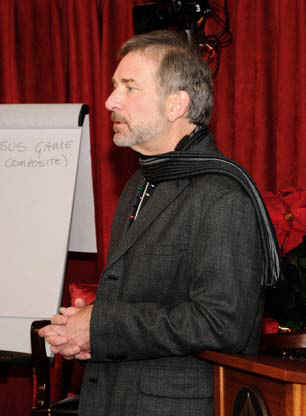 You knew you'd be coming to this point, that you would need
this, want it, and here it is.
You knew you'd be coming to this point, that you would need
this, want it, and here it is.
It probably would have been really upsetting to energetic balances to have it sprout 2,000 years ago. Even your composite Yeshua knew that. When there were those who were pushing and pressuring him to say, βNo, make it blossom right now. Bring it out right now. We see it in you. We want it now,β almost like a little bit of a greed, Yeshua said, βNo, it's not quite ready.β
They said, βYes, but Master, Master, when will we be ready? Will it be a year from now, ten years from now? Will you teach us how to get ready?β And Yeshua said, βI can't.β He said, βI can tell you're not ready, because you still don't trust yourself. You've still put me on a pedestal. You still want me to save you, perform miracles for you, teach you. No, you're not quite ready.β
So it ended for Yeshua, in a way. In another way it's lived on. The story split, you know, of course. The story of Jesus from the Bible and then there's the story of Yeshua. The story of Yeshua has lived on also. That energy, that Christ seed, that blessing has lived on to right now.
But that part of you that is Yeshua comes back once again with you saying, βNow we're ready for that Christ seed to blossom, to grow.β
That same composite of Yeshua says to you, βAre you ready to trust?β Two thousand years later he says, βI come back to you. Are you ready to trust yourself deeply, unequivocally, unconditionally, no ifs, ands or buts or I don't knows.β Comes back to say, βAre you ready to be in that state of your own divine trust no matter what? Even if you think that you're making mistakes, going beyond that and be in a place of trust. Even if it scares you, terrorizes you at the deepest level, brings up all your fears β fears of disease, fears of poverty, fears of being alone, fears of, well, the ending β are you ready to be in that state of trust?β
And I don't want to sugarcoat it and say βOh trust yourself. It's so joyful and fun and happy and sunshine and rainbows. No. It's demons and dragons as well. It's fear that could come up within you that will freeze you β freeze your brain, freeze your body. Freeze, like as in cold. To trust yourself that deeply and that implicitly kind of makes your belly spin. Overwhelms your mind β too many thoughts, too many questions.
That's the tool for next year β trust. Oh, we've talked about it so many times. But it's back.
For some of you that's all you have left, in a way. Sure you've got some clothes and a bottle of cheap wine in the refrigerator, but that's really all you have left. Your bank account is run down. Car probably won't make it for another year. But you've got this trust.
Let's not play the Jesus Game on this one. Let's not have it end like it did for him, because with that trust everything changes. Funny thing is you don't even have to think about it. You don't have to plan anything after that. You don't have to work at things. It's coming to that level of trust. You don't have to worry about other people, the IRS or anything else like that, the aliens and the conspiracies.
When you're at that deep, simple, basic level of trust the other stuff just doesn't touch you, doesn't affect you.
So this is going to be something that comes up again for you this, oh, at least next 30 days or so before our next Shoud. The question, βHow does it end?β and the question βCan I allow myself that level of trust?β
And before you answer the question, if you say yes, you'll get the experience that will β how to say β confirm within yourself, so that trust just isn't just a mental concept, that it's right in there with your knowingness. Then you'll be able to fly through anything, anything.
Let's take a good deep breath, my dear friends.
 Rejoicing in this holiday season and the fellowship that we
have here and the laughter from today, being able to talk about Yeshua and
Jesus, being somewhat irreverent. No, really irreverent. Can't wait to see the
YouTube clips on this one. (laughter) But coming down to the point of, well,
what really matters; what really, really matters.
Rejoicing in this holiday season and the fellowship that we
have here and the laughter from today, being able to talk about Yeshua and
Jesus, being somewhat irreverent. No, really irreverent. Can't wait to see the
YouTube clips on this one. (laughter) But coming down to the point of, well,
what really matters; what really, really matters.
Let's take a good deep breath and always that knowingness that no matter what, no matter how difficult, no matter how amazing that, well, all is well in all of creation.
And so it is.
I Am Adamus, in joyful service to you. Thank you. Thank you. (audience applause)
γ
* * * * * * * * * * * * * * * * * * * * * * * * * * * * * *Please freely distribute this text, in its entirity, on a non-commercial, no-charge basis, including these notes. All other uses must be approved in writing by Geoffrey Hoppe,Golden, Colorado.
See contacts page on website: www.crimsoncircle.com
Β© Copyright 2013 Geoffrey Hoppe, Golden, Colorado USA 80403
γ
γ